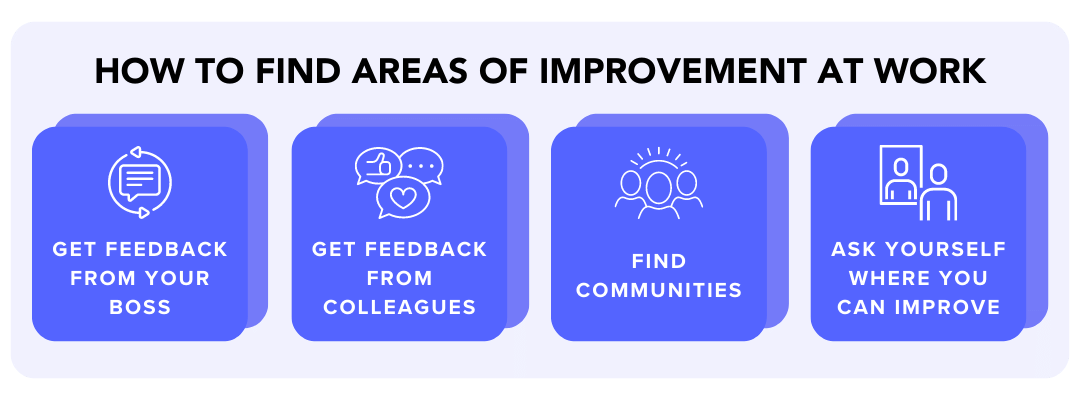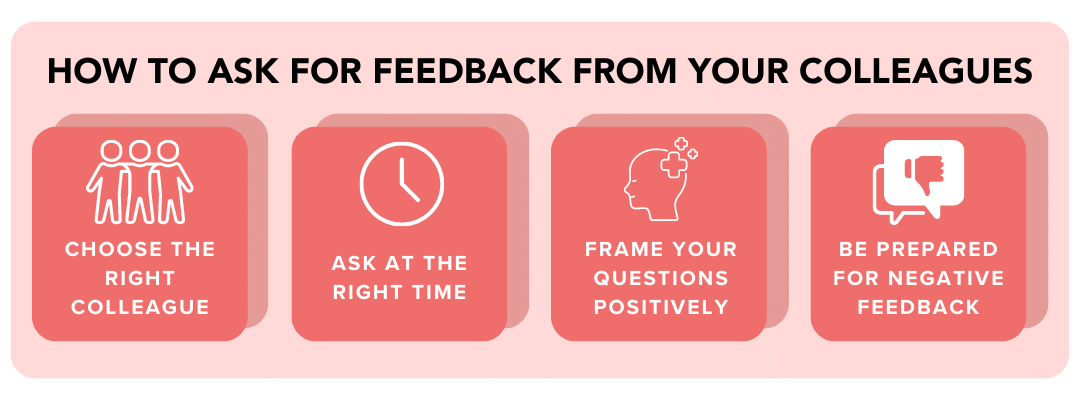Professional development isn’t just about taking courses and earning shiny new certifications. It also involves taking the time to examine your skills and abilities and finding areas of improvement at work.
Working to improve professional weaknesses is a practice that can bring employees success in their careers. Seeking feedback and taking steps to better your skills at your job can improve your overall workplace experience and lead to greater opportunities down the line.
But let’s face it— digging into the areas of our professional lives where we fall short can be an intimidating.
Luckily, it’s not something we have to do alone. Whether it be your manager, colleagues, or a professional community, there are people out there ready to help you grow.
Why you should look for areas of improvement at work
Professional improvement doesn’t just benefit your employer— it benefits you, both in the short-term and the long run. When you focus on bettering yourself and your skills, you:
- Challenge yourself and find confidence in your abilities
- Engage yourself and find passion in the work that you do
- Create transparency and honesty between yourself and your colleagues
- Open the doors to opportunities for growth and advancement within your organization
Professional improvement can also help you meet your long-term career goals. Many times, the skills that you hone will be transferable across any career path. Even if you don’t foresee yourself staying in your current industry, you can take the skills you’ve worked on and put them into practice elsewhere!

How to find areas that need improvement
If your workplace values feedback, you may find yourself with opportunities like performance reviews or one-on-one meetings to find your areas for improvement. In other cases, you may have to actively seek out your feedback.
Here are a few ways to do it.
1. Ask for feedback from your boss
Seeking out feedback from your boss or manager may seem daunting, but it’s a great habit that shows your commitment to bettering yourself and contributing to the success of your company.
The best way to receive feedback from your higher-ups is to simply ask. Some employers have a specialized system to facilitate feedback, but if yours doesn’t, reach out to your boss to schedule a meeting. Be sure to let them know that you are looking for feedback ahead of time. This will allow them to prepare their responses and adequately evaluate your performance.
Once you have a meeting set up, there are a few things to keep in mind.
- Prepare ahead of time: It’s important to show up prepared. Jot down some relevant questions that you may have pertaining to your work performance. On the day of your meeting, be prepared to take notes.
- Dig deeper and ask questions: Feedback doesn’t do much good if you aren’t able to act upon it. If you aren’t sure how you can improve your performance, ask your manager. They may be able to give you resources, helpful tips, or advice on how to handle particular situations.
- Be positive and gracious: Even if you don’t completely agree with the feedback, remain positive and gracious for the time your manager took to help you.
After you receive feedback from your manager and implement changes, communicate progress with them. This shows that you took their advice seriously and are making moves to grow.

2. Ask for feedback from your colleagues
You can also seek feedback from your peers who work with you, not just above you. They may have a different experience and point of view from your managers that can be helpful in optimizing your day-to-day performance.
Keep the following points in mind when asking for feedback from your peers.
- Choose the right colleague: Identify peers who collaborate closely with you for relevant feedback. Consider their experience working with you.
- Ask at the right time: Set up a meeting at a time convenient for both parties, allowing ample preparation time. Ensure you’re mentally ready to receive feedback.
- Frame questions positively: Pose inquiries in a constructive light, focusing on areas for improvement rather than shortcomings. For instance, ask, “How can I enhance team support in future projects?”
- Handle negative feedback gracefully: Even if it’s challenging, accept constructive criticism graciously. Thank your colleague for their input and express openness to consider their perspective for growth. Remember, it’s about improvement, not personal critique.
Don’t be afraid to revisit feedback with peers. Follow up several weeks or months later to see if your post-feedback changes have made a positive impact.
3. Find communities that can offer advice
Professional organizations, networking groups, and online communities can be great places to get advice and critiques on everything from projects to specific problems you face in the workplace. Members of these groups can offer unbiased opinions that you may not be able to get from those that work with you. They can be great places to learn from others and find helpful resources.
Not sure where to find a community? Facebook groups are a great place to start. Try finding a group that is related to your industry or job position that is dedicated to helping one another grow and learn.
4. Ask yourself where you think you can improve
Sometimes the best person to ask for feedback from is yourself! Don’t forget to check in with yourself and evaluate where you believe you can improve upon.
Self-evaluate your performance and analyze what causes you the most stress at work.
Some areas of improvement examples include:
- Time management: Are you struggling to meet deadlines? Do you often misjudge how long a task will take to complete?
- Leadership: Do you take charge on projects and tasks, or do you take a backseat and wait for instruction?
- Confidence: Do you lack confidence in your abilities? Do you second guess yourself and your work?
- Goal setting: Are you unsure where you want to go in your career or what you ultimately want to do?
Take time to consider these and other similar strengths and weaknesses. If you’re finding yourself critiquing more than a few areas, narrow down the points that need the most attention and aim to work on those first.
Make a plan for growth
Once you get your feedback, be sure to make a plan for your improvement. Set actionable steps to help you on your journey and set personal goals for you to achieve. Don’t forget to check back in with those who offered feedback— you might be pleasantly surprised to see just how far you’ve come!
